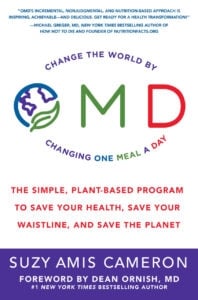
What if everyone on earth ate one plant-based meal every day?
That’s a world Suzy Amis Cameron—former actor and current environmental advocate—wants to live in. And she’s written the guidebook to get us there: OMD: The Simple, Plant-Based Program to Save Your Health, Save Your Waistline, and Save the Planet.
In OMD, Amis Cameron writes that “by switching one meat- or dairy-based meal to one plant-based meal a day, we can slash our personal water and carbon footprint of our diet by about 25 percent. If we go fully plant based, we can slash it by 60 percent.” Whoa.
“That is really motivating,” Amis Cameron tells alive in an exclusive interview. “Changing our diets is one answer to climate change, and it’s something everyone can do right away.”
A kitchen blow-up
Amis Cameron’s plant-based awakening began in May 2012 when she watched Forks Over Knives. The groundbreaking documentary reveals the effects of animal-based and processed foods on health. She asked her husband, Oscar-winning film director James Cameron (best known for his blockbusters Avatar and Titanic), to watch it the following day.
“He turned to me and said, ‘We shouldn’t have any more animal products in the house,’” says Amis Cameron. Twenty-four hours later, there were none.
“That’s how we roll,” says the willowy blonde of their sudden switch to plant-based eating. But realistically, she says, “I know not many people blow up their kitchens one day and go cold turkey.”
An environmental bombshell
Amis Cameron grew up on a farm in a meat-centric family, eating what they raised themselves. “I thought we all needed to eat meat for a strong, healthy body and dairy for strong bones and teeth,” she admits.
Soon after making the dramatic change to a plant-based diet, she dove into environmental research, spurred on by her husband. “I was hearing information I never knew, even after decades in environmental circles working with large NGOs—no one ever talked about [how] animal agriculture plays a significant role in ocean dead zones, biodiversity loss, climate change, pollution and animal and plant extinction,” says Amis Cameron. “For me, this is news they should be broadcasting from the mountaintops.”
She set out to do just that, focusing her first efforts on those who will be most affected by climate change: kids.
A new kind of school
Thirteen years ago—long before she went plant based—Amis Cameron opened MUSE School CA with her sister, Rebecca Amis, in response to watching their oldest kids going through school systems “that didn’t nurture them and squashed their little spirits.” Amis Cameron says, “I could not find a school that checked all the boxes: respected them as individuals; taught them about respecting themselves, one another and the planet; and fed them healthy, delicious food.”
MUSE’s mission and methods struck a chord: 11 original enrollees blossomed into hundreds more, ages two to 18, from all over the world. But when the school became 100 percent plant based in 2015, it lost half its families.
Amis Cameron recalls, “The head of school said, ‘People, it’s only one meal a day … it’s OMD!’”
The revelation eased parents’ concerns, and today, 220 students are enrolled at MUSE. Along with rigorous, nurturing educational experiences, students tend 150 raised garden beds that grow 60 to 90 percent of the produce they eat daily.
“That experience gave me the idea to gather the science and information I had learned about how we can move the dial on climate change by eating one plant-based meal a day—plus some delicious recipes—into a book,” says Amis Cameron.
Her goal for those who read it? “To walk away empowered as individuals.”
A bright future
In the pages of OMD (and on the website omdfortheplanet.com), Amis Cameron makes plant-based eating accessible, not scary or divisive. “In the past, people didn’t want to talk to us about plant-based eating because we were so hardcore about going 100 percent plant based,” she says. But “with OMD, across the board as I tour, the response has been, ‘That seems reasonable. Tweak one meal a day? That seems easy.’ The reception has been amazing!” Some people, she says, even recognize they’re already doing it and set a new goal of two meals a day.
Amis Cameron is also pioneering plant-based food in schools across the country. She launched the One Meal a Day pilot program in the Triangle area of North Carolina after recognizing it as ground zero for climate and food justice, “an area impacted by climate change and factory farming, yet with a community passionate about solutions and what they eat.” This year, she’ll debut OMD food products in Canada and field interest in launching MUSE schools globally that follow OMD.
That means even more parents and students will take the OMD Pledge: “Together with my family, I will eat One Meal a Day for the Planet—or two, or three.” It’s simple. And it just might save the world.
How green are greens?
Using OMD’s The Green Eater Meter (available at omdfortheplanet.com/why-it-matters/planet/), we compared the resources needed to produce common non-plant-based foods versus plant-based alternatives (based on single servings).
Beef vs. beans
- A serving of beef uses 36 square miles of land and 570 gallons of water.
- A serving of beans uses 0.15 square miles of land and 21 gallons of water.
Chicken vs. plant-based chicken strips
- A serving of chicken uses 1.2 square miles of land and 106 gallons of water.
- A serving of plant-based chicken strips uses 0.13 square miles of land and 18 gallons of water.
Cow’s milk vs. cashew milk
- A serving of cow’s milk uses 0.36 square miles of land and 43 gallons of water.
- A serving of cashew milk uses 0.09 square miles of land and 8 gallons of water.
Pork vs. plant-based sausage crumble
- A serving of pork uses 0.8 square miles of land and 111 gallons of water.
- A serving of plant-based sausage crumble uses 0.17 square miles of land and 23 gallons of water.
 OMD: The Simple, Plant-Based Program to Save Your Health, Save Your Waistline, and Save the Planet (Atria Books, 2018) contains everything you need to switch to one or more plant-based meals a day: compelling health and environmental research, meal plans, shopping lists, delicious recipes and more.
OMD: The Simple, Plant-Based Program to Save Your Health, Save Your Waistline, and Save the Planet (Atria Books, 2018) contains everything you need to switch to one or more plant-based meals a day: compelling health and environmental research, meal plans, shopping lists, delicious recipes and more.
























